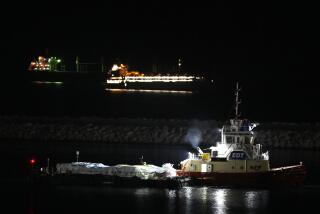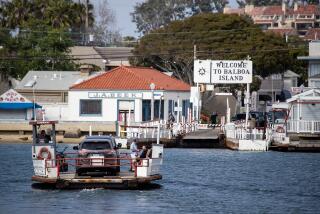Ferry Plan Threatens a Scottish Way of Life
TARBERT, Outer Hebrides — There is a whiff of fire and brimstone in the Outer Hebrides these days as the islanders of Lewis and Harris prepare to defend their Sabbath against a ferry invasion from the Scottish mainland.
Life is rugged in these treeless, wind-swept peatlands, and Sunday is the high point of a week otherwise spent fishing, tending sheep and weaving Harris tweed. Pubs and playgrounds close on Sundays, flights are suspended, TV and newspapers are shunned and the only travel is to church.
Thus to these flinty Presbyterians, the decision by the Caledonian MacBrayne ferry company to begin Sunday sailings next summer is a threat to civilization as they know it. They see tourists and trucks shattering the Sabbath peace.
Seeks to Allay Fears
The company has sought to allay these fears by modifying its itinerary so that ferries will sail out but not in, but the islanders say Hebridean harbor staff will still be forced to go to work instead of to church.
“The people of these islands value their principles, their Sunday, their way of life, and we are determined to protect these to the bitter end,” says John Murdo Morrison, a hotelier in Tarbert, where the ferry is to dock.
But other forces are at work. Calmac, as the ferry company is known, is to be privatized under Prime Minister Margaret Thatcher’s drive to sell off state-owned industries, and it says that once exposed to market forces, ferries cannot lie idle on Sundays.
Enterprise, Traditions
Thus the Thatcherite imperatives of free enterprise are bumping up against ancient traditions in what The Sunday Times in London calls “Britain’s deepest cultural battle.”
Donald McLeod, a fisherman, vows to lead a blockade of Tarbert’s tiny harbor when sailings commence next summer, and Calmac, which has served the Hebrides for more than a century, says it may ask the Royal Navy to step in.
Calmac, warns Morrison, is “sailing into a horrendous Hebridean hurricane.”
Denounced by Preachers
Denunciations have poured forth from the pulpits, and The Stornoway Gazette and Local Advertiser is filled with angry letters.
“Sunday sailors will be cursed,” writes reader N.M. MacLean, while John MacRae turns to verse: “The forces of evil are in battle array/To destroy the Sabbath wherever they may. . . ./We would resolve, as Shadrach of old/That we will not bow to their image of gold.”
At a time when much of Britain is jumping through hoops in the chase for tourists, it is interesting to find a place that is actively fighting to keep them out.
Sees a Just Cause
Sandy Matheson, head of the Hebridean local authority, concedes that “some see us as cranky individuals,” but he believes the cause is just.
“We have a day apart. The mainland of Britain has no day apart. It suffers from the most appalling problems of urbanization, antisocial behavior, vandalism,” he said in an interview in his office in Stornoway, the Hebridean capital.
“Now why on Earth are we going to change by giving up our day apart which we deem to be so precious?”
Calmac director Colin Paterson says he understands the islanders’ sensitivities, but believes that plenty of islanders want a Sunday service, and he sees nothing un-Christian about using it.
Peter McKibbin, a retired Stornoway businessman and lone voice in favor of Sunday sailings, says the opposition is confined to one segment of the archipelago--the adjoining islands of Lewis and Harris.
Solidly Presbyterian
On these islands the population of 22,000 is solidly Presbyterian. Farther south, on the Uists, Benbecula and Barra, where the 9,000 islanders are predominantly Roman Catholic, Sabbath rules are less stern and there have been few objections to Sunday sailings.
Calmac’s compromise plan entails the ferry leaving Tarbert on Sunday for Uig on the mainland and not returning to Tarbert until Monday.
But Morrison says it is “the thin end of a wedge,” because once the principle is established, Sunday sailings into Tarbert will follow.
Paterson, he says, is an Englishman who cannot understand the islanders’ preoccupations. “I was born in this village, I was brought up in it, and I intend to make sure that it’s not going to be eroded by Sassenachs,” he said, using the Scottish pejorative for Englishmen.
“You must not become a slave to tourism,” he said, “because you lose your identity once that happens.”
More to Read
Sign up for Essential California
The most important California stories and recommendations in your inbox every morning.
You may occasionally receive promotional content from the Los Angeles Times.










